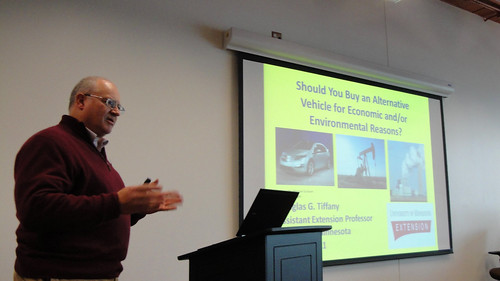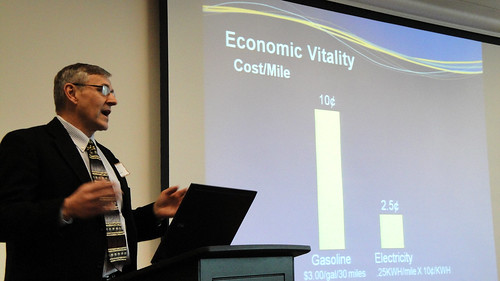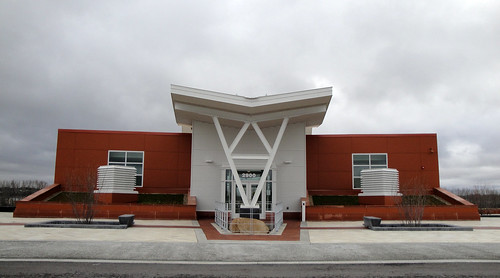April 29, 2011, Rochester, MN – Did you know that Rochester is home to Minnesota’s first electric car charging station? Over 60 people joined the Clean Energy Resource Teams (CERTs) and Cascade Meadow Wetlands & Environmental Science Center April 26 to learn more about electric cars and their needed infrastructure from utility representatives, and a University Extension educator.
The event was kicked off by Stefan Theimer, who welcomed folks to Cascade Meadow and gave a brief overview of the facility’s LEED certification, wind turbines, and plans for the surrounding property to hold seven types of wetlands. He welcomed the public to visit Cascade Meadow during its opening day Saturday, June 4th from 9am to 4pm. The open house will include building tours, renewable energy tours, interactive exhibits, wetland restoration updates, family activities, and storm water feature tours.
Joel Haskard, Co-Director of CERTs, introduced speakers including representatives from Xcel Energy, Drive Electric Minnesota, Great River Energy, Rochester Public Utilities, Southern Minnesota Municipal Power Agency, and University of Minnesota Extension. “Electric cars are a very hot topic right now, especially with increasing gas prices,” said Joel Haskard, Co-Director of CERTs. “This forum addresses some of the challenges and opportunities that Minnesotans need to know before deciding if it’s the right fit for their family and community.”
 “There are three important reasons to use electric cars: national security, economic vitality, and environmental sustainability,” said Greg Palmer, who is both Director of Account Management at Xcel Energy and a member of Drive Electric Minnesota, a partnership of public and private entities that promotes electric cars. “The money we spend on gas would much better be spent in our communities, contributing to our state’s economy and adding economic vitality, rather than flying out of our pockets overseas,” added Palmer.
“There are three important reasons to use electric cars: national security, economic vitality, and environmental sustainability,” said Greg Palmer, who is both Director of Account Management at Xcel Energy and a member of Drive Electric Minnesota, a partnership of public and private entities that promotes electric cars. “The money we spend on gas would much better be spent in our communities, contributing to our state’s economy and adding economic vitality, rather than flying out of our pockets overseas,” added Palmer.
Professor Doug Tiffany, Assistant Extension Professor of University of Minnesota Extension shared models that show the cost benefit of electric vehicles, depending upon gas prices and miles driven. Tiffany compared the capabilities of Conventional Vehicles (ICE), Hybrids (HEV), Electric Vehicles (EV), and Extended Range Electric Vehicles (PHEV). Electric Vehicles are often cost-effective choices if the consumer drives enough distances and can tolerate range issues. Electric cars are also better suited for people living in urban areas, within 20 miles of work; electric cars present more challenges in rural areas.
Showing a newspaper ad for an electric Rolls Royce, Dan Hayes, Manager of Renewable Energy and Agency Communications at Southern Minnesota Municipal Power Agency, joked that he was contemplating buying one since “they’re a mere $3 Million.” Joking aside, Hayes said every car manufacturer in the world is working on an electric plug-in vehicle, except Fiat, which is working on creating a natural gas powered vehicle. The U.S. Department of Energy has set a goal of one million electric vehicles on the road by 2015. Hayes listed the pros and cons of electric vehicles, saying that the cons that exist can be resolved by improvements in batteries, resulting in lower cost, higher power density, and better thermal management.
 Eddie Webster, Load Management Coordinator of Great River Energy (GRE), showed how charging electric vehicles impact GRE’s load. Webster mentioned that batteries for Electric Vehicles cannot be used for charging cars after they have 80% capacity remaining. However, Webster said that utilities are looking into potentially buying batteries used at 80% to install in neighborhoods as energy storage systems which could hold renewable energy.
Eddie Webster, Load Management Coordinator of Great River Energy (GRE), showed how charging electric vehicles impact GRE’s load. Webster mentioned that batteries for Electric Vehicles cannot be used for charging cars after they have 80% capacity remaining. However, Webster said that utilities are looking into potentially buying batteries used at 80% to install in neighborhoods as energy storage systems which could hold renewable energy.
Steven Cook, Senior Electrical Engineer of Rochester Public Utilities (RPU), said RPU may add one or two more charging stations in the next year, in addition to Minnesota’s first charging station, located at 1st Street Parking Ramp, west of the library, in Rochester. Greg Palmer mentioned that 60 charging stations are planned for installation in the Twin Cities, including some with solar chargers.
Cook mentioned that even if utilities offer low rates for charging during non-peak times, there are still challenges, including the cost required to change the infrastructure to have multiple meters to register varying rates. Both Cook and Palmer mentioned that utilities are looking into how to structure incentives so people will use electricity when there is less demand on the electrical grid. All electric cars will have at least Level One charging (110 voltage- household standard; takes 8 – 10 hours to fully charge), and Level Two (240 voltage; 4-6 hours), but not all will have Level Three (480 volts; 10 minutes). The speed of discharge does affect battery life, so charging them at a slower rate makes batteries last longer. Level Three could create challenges for utility loads if a substantial number of electric vehicles were charging during peak demand in the summer.
 Also noted during the forum was that although the efficiency and batteries of electric cars have significantly improved in the last decades, electric car performance in Minnesota winters still needs further testing.
Also noted during the forum was that although the efficiency and batteries of electric cars have significantly improved in the last decades, electric car performance in Minnesota winters still needs further testing.
Following the electric car forum, Cascade Meadows offered a tour of its Energy Fun House which is an interactive exhibit highlighting energy efficiency improvements for homes, in the upper level of its LEED-certified building.
We welcome you to download the presentations from our fantastic speakers:
- Greg Palmer, Xcel Energy and Drive Electric Minnesota
- Doug Tiffany, University of Minnesota Extension
- Dan Hayes, Southern MN Municipal Power Agency
- Eddie Webster, Great River Energy
- Steve Cook, Rochester Public Utilities
Photos from the event:
Click here to see more photos from the event and click here to download a PDF version of these event highlights.
Media from the event:
- CERTs Press Release
- KAAL TV – Rochester Holds Electric Car Forum
- Rochester Post-Bulletin – Experts: Time right for electric cars
About our host: The mission of Cascade Meadow Wetlands & Environmental Science Center is to establish itself as a regional resource for environmental education, with an initial focus on energy, water and wetlands. Cascade Meadow aims to serve as a catalyst for meaningful and enduring learning that promotes sustainable living now and for future generations by encouraging personal and organizational change, as well as fulfilling environmental careers. Join Cascade Meadow for its opening day June 4th. Learn more at www.cascademeadow.org
Looking for more? Check out these recent posts:
- Clean Cities Coalition in Minnesota works to expand electric vehicle use
- Electric vehicle use grows in Minnesota fleets: Interview with the DNR
- Drive Electric Minnesota partnership charged up, rolling, and welcoming newcomers
- Alternative Vehicle Decision Tool: Is an Electric Vehicle or a Hybrid the Right Car For You Now?
- Solar-powered car charging stations to grace St. Paul’s Como Park
- Electric Vehicles are Coming! Prepare with a Few Handy Resources
- Innovative ChargeWise Program from Great River Energy: An Interview with Eddie Webster
